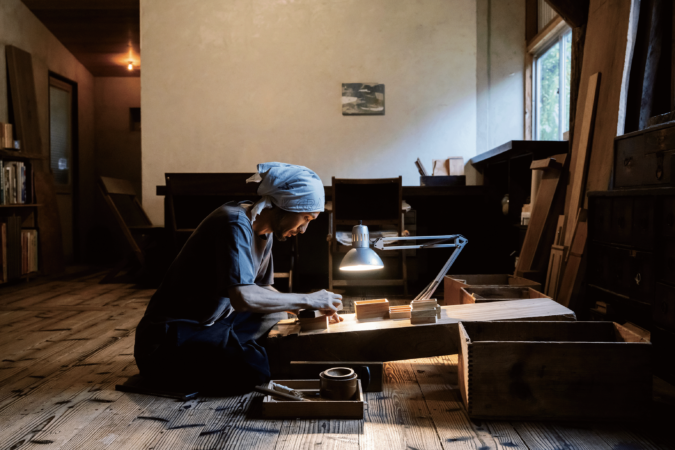In Tokyo, chefs from around the world challenge their knowledge of the techniques and spirit of Japanese gastronomy
The theme of the 10th edition of the Washoku World Challenge was ‘dashi’, the central stock of the country's gastronomy.

Every year, Japan’s Ministry of Agriculture, Forestry and Fisheries (MAFF) holds the Washoku World Challenge, a contest of international chefs. In 2023, the competition celebrates a milestone, its tenth anniversary. After two online editions, due to the Covid-19 pandemic, the event is taking on a hybrid format with a regional qualifying tournament in Paris, New York or Singapore, as well as an online qualifying tournament.
These took place from October to December 2022 and six finalists qualified for the final tournament held on 27-28 February 2023 at the Tokyo Kaikan Cooking School in Tokyo. In the final, the competing chefs were expected to prepare dishes with specified ingredients such as crab and specifically for the dishes provided: a nimonowan bowl for simmering dishes and a hassun plate of five small starters, usually served at the beginning of a kaiseki meal. The six finalists proudly met the challenge in two days.
A balance between the flavours and the dressing
This year, the theme of the competition was dashi. This broth is a fundamental element in Japanese gastronomy, as it is considered to be the key ingredient that provides umami, that fifth flavour that is so subtle and characteristic of the country’s cuisine. Mastering dashi is therefore very important for those who venture into Japanese gastronomy. This is what each candidate wanted to demonstrate by using his or her own techniques to get as much umami as possible from the dashi and win.
The criteria examined in the final included the correct preparation of the dashi, the inclusion of the dashi theme in the recipes, the balance between the taste and the preparation, as well as the knowledge of the utensils. All of this in compliance with sanitary regulations and in a limited time.
Under the intense gaze of the judges and in a tense atmosphere, the finalists took up the challenge without losing their seriousness. They presented the jury with the characteristics of their five entries and how they reflected the theme with all their heart. Each of them also politely answered the examiners’ questions about their preparation of ingredients, their conception of flavours and their presentation.
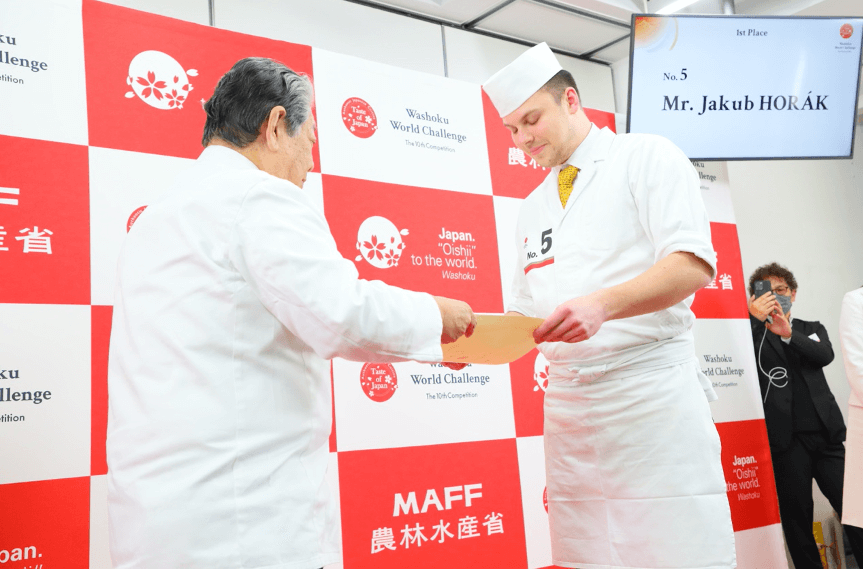
The overall winner of the final was the first-place candidate in the European Regional Qualifying Tournament, Czech Jakub Horák.
‘What mattered to me was to enjoy the experience, which allowed me to approach the competition in a relaxed manner,’ he explained happily shortly after his victory. ‘I wanted to combine ingredients from my home country, the Czech Republic, with Japanese cuisine. This made me realise once again how the depth of Japanese cuisine allows for creativity. I am very grateful to the jury who valued this intention. I intend to continue sharing the splendours of Japanese cuisine with as many people as possible.’
The 10th edition of the Washoku World Challenge ended with the words of the head judge, Yoshihiro Murata, who was not sparing with his compliments towards the finalists who had just participated in a difficult and high-level event.
‘Nimonowan’
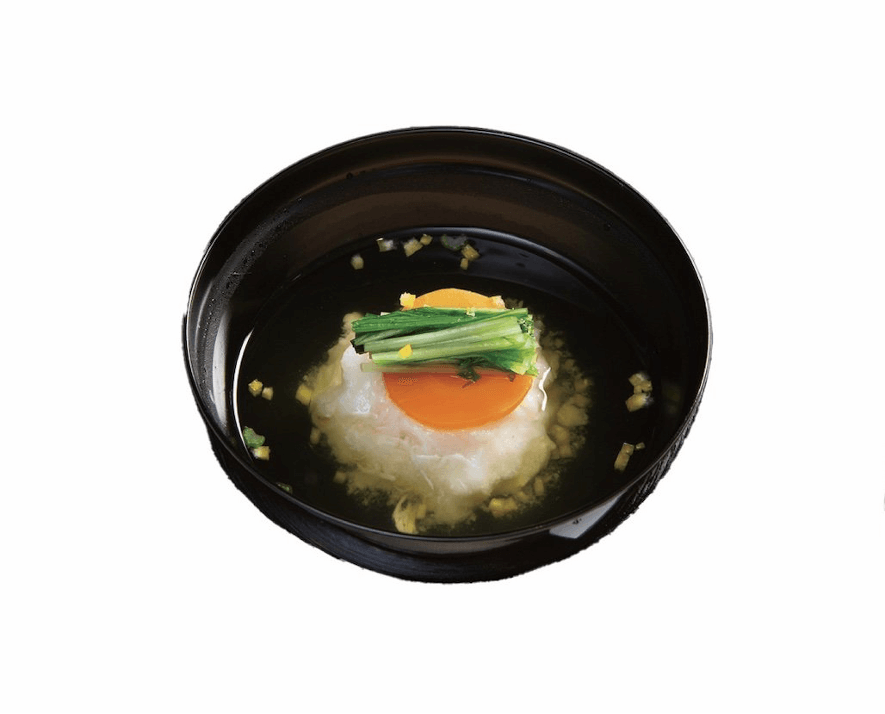
A very clever dish combining crab and surimi in a very natural way with a signature shower of yuzu cubes.
Five entries on the theme ‘Five plum leaf tales’
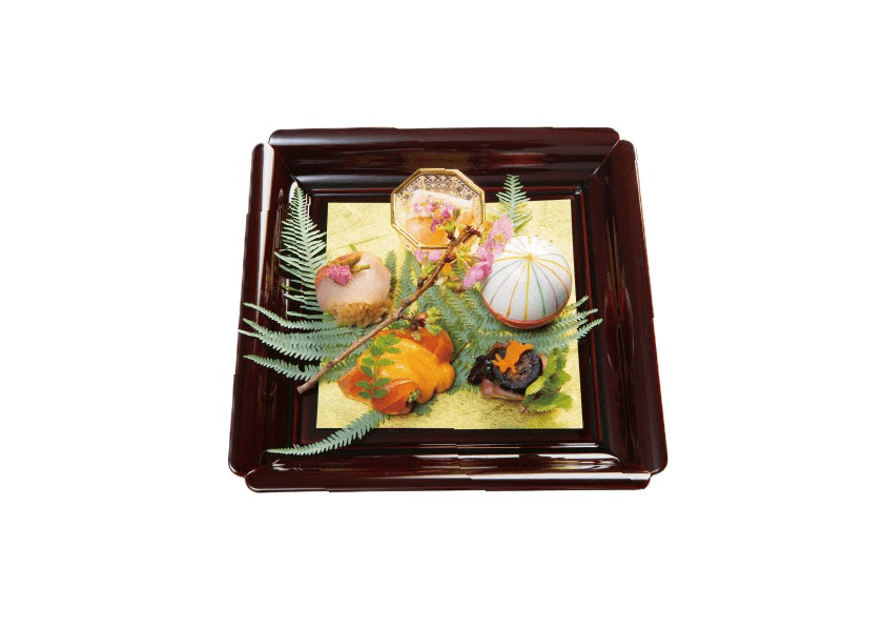
A seasonal yellowtail sushi is topped with pickles while a roast duck is wrapped in hatcho miso and walnuts, in a nod to Czech produce.
The finalists
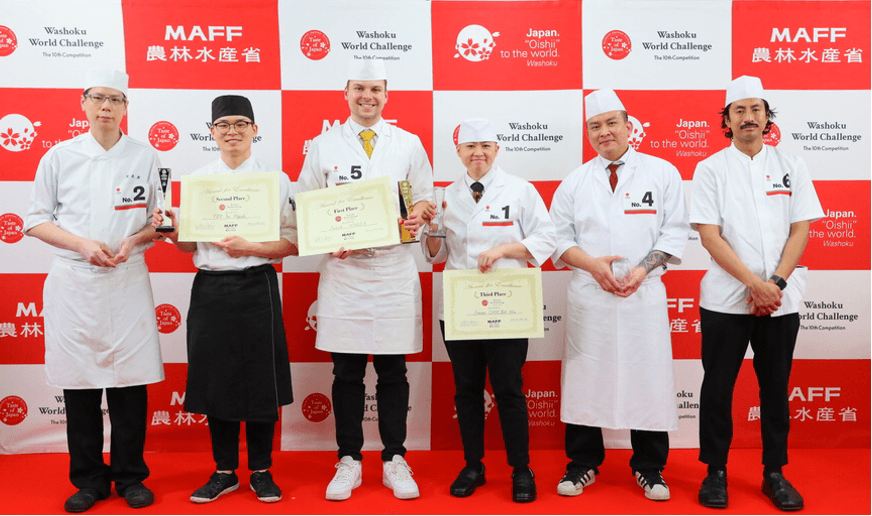
The candidates who participated in the final, from left to right: Yang Peishih (Taiwan), Yeo In Hyeok (Korean living in Japan), Jakub Horák (Czech Republic), Aeron Choo Boh Hin (Republic of Singapore), Yoo Kok Hoong (Malaysian living in Singapore) and Czar Tagayuna (USA). All of them are connoisseurs of Japanese gastronomy who came to improve their skills.
Before the final, the finalists were given lessons by top Japanese chefs. At the end of the competition, they all embarked on a journey of discovery of Japanese food products and visited producers of miso, soy sauce and sake. Beyond the techniques they learned, this trip allowed them to deepen their knowledge of Japanese gastronomy and its products and to become better acquainted with the status of Japanese chefs, their culture and their history.
More information about the Washoku World Challenge, this year’s events and judges, past winners and messages left by finalists, as well as articles and videos about Japanese gastronomy are available on the competition website.
TRENDING
-
Hiroshi Nagai's Sun-Drenched Pop Paintings, an Ode to California
Through his colourful pieces, the painter transports viewers to the west coast of America as it was in the 1950s.

-
A Craft Practice Rooted in Okinawa’s Nature and Everyday Landscapes
Ai and Hiroyuki Tokeshi work with Okinawan wood, an exacting material, drawing on a local tradition of woodworking and lacquerware.

-
The Tattoos that Marked the Criminals of the Edo Period
Traditional tattoos were strong signifiers; murderers had head tattoos, while theft might result in an arm tattoo.

-
‘Shojo Tsubaki’, A Freakshow
Underground manga artist Suehiro Maruo’s infamous masterpiece canonised a historical fascination towards the erotic-grotesque genre.

-
‘Seeing People My Age or Younger Succeed Makes Me Uneasy’
In ‘A Non-Conformist’s Guide to Surviving Society’, author Satoshi Ogawa shares his strategies for navigating everyday life.


